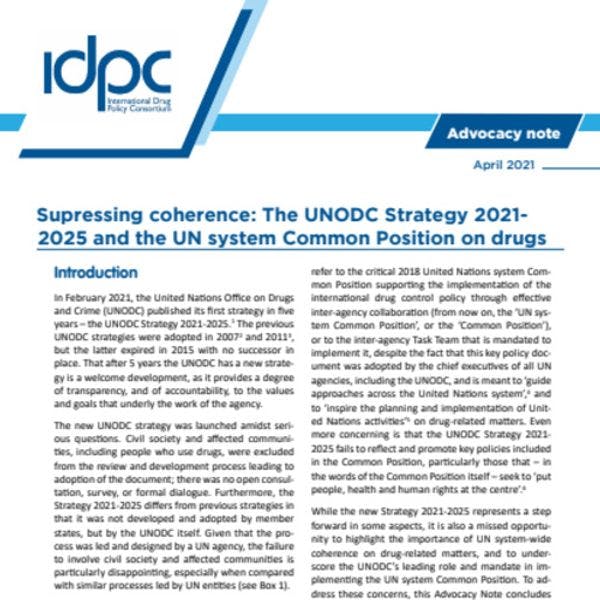IDPC
Suppressing coherence: The UNODC Strategy 2021-2025 and the UN system Common Position on drugs
This advocacy note provides a critique of the UNODC Strategy 2021-2025, the first strategy documented to be adopted by the United Nations Office on Drugs and Crime (UNODC) in ten years.
The new UNODC Strategy was developed, drafted and approved without the participation of civil society and affected communities, including people who use drugs. This advocacy note shows that, under UN commitments and standards on civil society participation, voices and experiences from the ground should not have been excluded from the process.
Equally concerning, the UNODC Strategy 2021-2025 omits any reference to the 2018 UN system Common Position on drugs, the watershed policy documented adopted by all UN agencies that is meant to guide approaches on drugs across the UN system, placing health and human rights at the centre of all policies. Through a close reading of both documents, this advocacy note demonstrates that the UNODC Strategy 2021-2025 fails to reflect many of the most progressive policies endorsed in the UN system Common Position, from increasing investment in harm reduction to the decriminalisation of people who use drugs, thus undermining the political relevance and reforming power of the document itself.
The note concludes with several recommendations for the UNODC, and for member states, to ensure that the development and implementation of the UNODC Strategy 2021-2025, and other UNODC strategy documents, reflect the priorities set in the UN system Common Position, and include the voice of civil society and affected communities.
Downloads
Regions
Related Profiles
- Adrià Cots Fernández
- United Nations Office on Drugs and Crime (UNODC)
